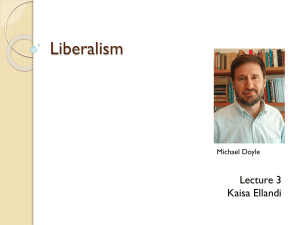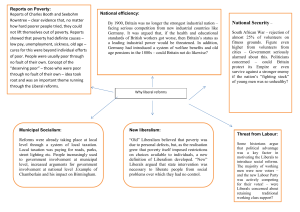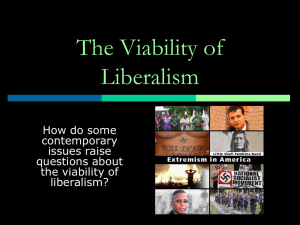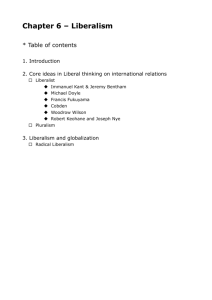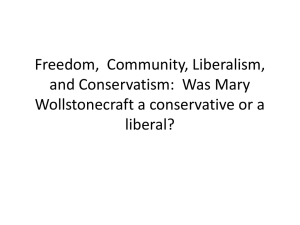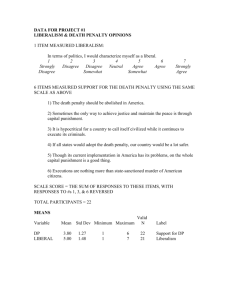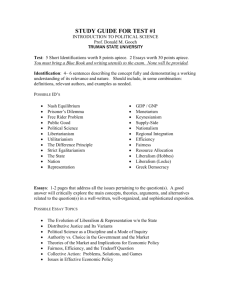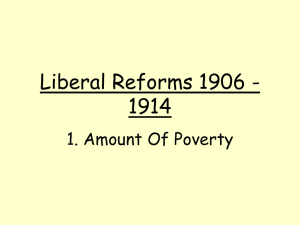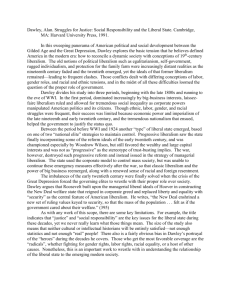A Bourgeois Creed
advertisement
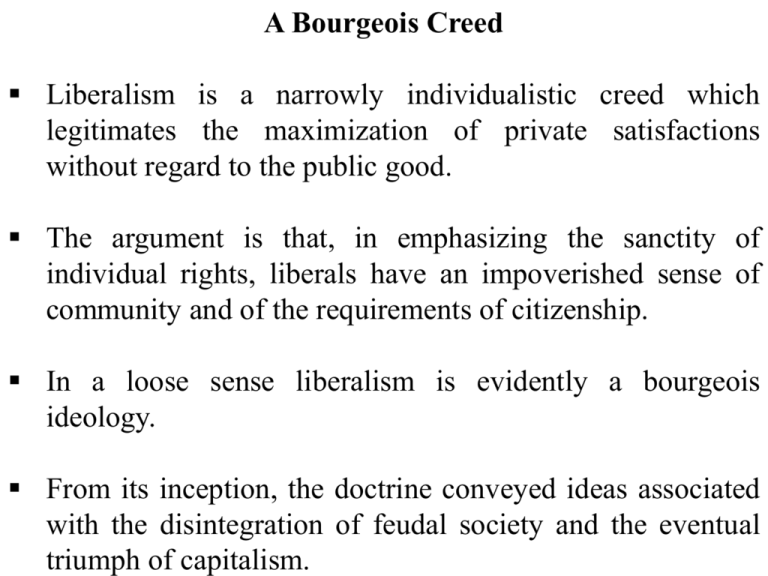
A Bourgeois Creed Liberalism is a narrowly individualistic creed which legitimates the maximization of private satisfactions without regard to the public good. The argument is that, in emphasizing the sanctity of individual rights, liberals have an impoverished sense of community and of the requirements of citizenship. In a loose sense liberalism is evidently a bourgeois ideology. From its inception, the doctrine conveyed ideas associated with the disintegration of feudal society and the eventual triumph of capitalism. What «Struggle» means in liberal accounts is to emancipate individuals from the shackles of traditional society. Early liberals challenged arbitrary power by appealing to universal principles. Individuals were said to come into the world with certain natural or inalienable rights, by which was meant an innate capacity and equal entitlement to manage their economic, religious and other affairs. The duty of the government, if there has to be one, is to protect the rights-freedoms of individuals. Legitimate government is rooted in the consent of those to whom its authority extends. The accusation of a social individualism can be legitimately made against free-market conservatives who sometimes depict society as a collection of competitive individuals joined by a common desire for security rather than by an awareness of citizenship. Locke argued that the ‘body of the people’ had a right to resist unjust government, and later liberals have advocated democratic elections and other forms of public participation. For Rawls the preservation of fair democratic institutions is itself a common good achieved, as he writes in A Theory of Justice. For early liberals this ideal of citizen self-rule was to be achieved through the dispersal of power and authority from In this loose sense, liberals did indeed construct a bourgeois ideology, arguing as they did that a well-ordered society depends upon virtues associated with the acquisition of private property. Liberals claim that they are in favor of one-class society, despite inequalities of wealth; there are common habits of self-discipline and responsible citizenship. Regardless of social class, economic situation, everyone has a vote. A Brief History Today’s liberalism basically evolved in a British context. In its classical phase, we have seen, liberalism took shape around the idea of natural rights, a concept which was given clear expression during the Civil War period of the 1640s. In The Freeman’s Freedom Vindicated (1646) a Leveller leader, John Lilburne, articulated the view pivotal to natural rights doctrine: that no form of authority is legitimate unless grounded in the consent of those affected by it. The Levellers, a group formed in 1646, whose extensive program of political reform took its bearings from the assumption of natural freedom and equality. Leveller proposals for redistributing authority to ordinary people included a written constitution to protect civil liberties by ensuring that government was bound by the rule of law and also limited in scope. Prominent among these liberties was the right to follow conscience in spiritual matters. Levellers were against any single religion to be dictated over the society. There should be toleration and permitting heterodoxy. Levellers were early exponents of a possessive individualism that licensed the pursuit of economic selfinterest. The Leveller objection to aristocratic privilege was that it sustained a hierarchy of social relations – ruler and subject, master and servant – contrary to the natural human condition of freedom and equality. The Leveller strategy for restoring the natural condition of freedom and equality was to construct a society in which no one depended upon the will of another. Without intending to ‘level men’s Estates, destroy Propriety, or make all things Common’, as their manifesto, An Agreement of the Free People of England, put it, the Levellers nevertheless proposed to disperse property ownership as widely as possible by eliminating economic monopolies. So, the Levellers were not narrowly bourgeois ideologues who anticipated a new age of capital accumulation and wage labor. Their ideal was a society of independent proprietors, enjoying ample space within civil society to shape their lives in a responsible manner, respecting the liberties of others. Here was the image that recurred in later liberal writings: a one-class community of autonomous citizens, each responsible for his own affairs and making a particular contribution to the common good. In the eighteenth century those claiming to be heirs of the struggles of the previous century against absolute monarchy and religious conformity were the Whigs, who favored a system of parliamentary government and a degree of religious toleration. They were liberal in endorsing civil liberties, but it was a ‘thin’ sort of liberalism. As men of wealth and rank, many of them beneficiaries of government patronage, many Whigs neither opposed aristocratic privilege nor advocated democracy, which they equated with rule by the rabble. These ‘conservative’ Whigs, embarrassed by that aspect of their ideological legacy which gave credence to demands for political and economic equality, often sidestepped the concept of natural rights. Whig support for limited government and religious toleration provided a tenuous link with the radicalism of the previous century. Although most eighteenth-century Whigs retreated from the radicalism of the previous century, others continued to resort to the idea of natural rights to urge the extension of civil liberties and political rights. The New Right of the 1980s is sometimes said to have been in the tradition of the nineteenth-century Manchester school of liberalism. But members of Manchester school, unlike free-market conservatives, were intent on eliminating prevailing inequalities. Some of them were involved in a free-trade movement which culminated in 1846 with the abolition of tariffs on imported grain. The Corn Laws, they believed, inflated the price of domestic bread, and were therefore a form of taxation on the poor for the benefit of landowners. Earlier liberals had condemned arbitrary government; Mill used the concept of liberty to warn of the danger of the tyranny of public opinion. In modern society, according to Mill, there were growing pressures to conform which inhibited individual spontaneity and cultural diversity. A person who is excluded from all participation in political business is not a citizen. He does not have the feelings of a citizen. The effect would be a ‘moral revolution’ providing the laboring classes with a sense of autonomy and of being engaged in the pursuit, not of competing private and sectional interests, but of a common good. Society had advanced to a stage where the poor had to be treated as citizens rather than subjects, Mill wrote in the same book, so that the ‘prospect of the future depends on the degree in which they can be made rational beings’. The Oxford philosopher and Liberal city councilor, T. H. Green (1836–82), said that freedom is not a license for a minority to frustrate the potential of others to contribute to the common good by making the best of themselves. The notion of classical liberalism changed over the time. L. T. Hobhouse (1864–1929), a prolific publicist of the new liberalism, detected in modern society the emergence of a higher form of morality because citizens were increasingly willing to set aside private interests for the sake of the common good. Hobhouse used his theory of evolutionary collectivism to justify a more extensive program of social reform than Green had envisaged. Hobhouse’s intention was to vindicate the measures implemented by the reforming Liberal government between 1906 and 1911, including the provision of old-age pensions and an insurance scheme for sickness and unemployment. In arguing for a minimum wage and other social rights, moreover, he discarded the assumption of earlier liberals that a market economy could provide everyone with the material basis of individual autonomy. The social dimension of wealth creation entitled government to treat a proportion of individual income as surplus that could be taxed to provide the poor with a basic wage and other benefits. Hobhouse derived the idea of a surplus from his friend, J. A. Hobson (1858–1940), who argued that the redistribution of wealth into a living wage for the poor would secure economic efficiency by providing them with new purchasing power. Two men, both members of the Liberal party, are regarded as the principal architects of the welfare or humanized capitalism which prevailed in Britain from 1945 until the ascendancy of the New Right in the 1980s. In The General Theory of Employment, Interest and Money (1936), J. M. Keynes (1883–1948) provided the classic vindication of a mixed economy in which the state assumes overall management of investment and consumption, while leaving production in the hands of private enterprise. This kind of hybrid economy preserved personal liberties and cultural diversity, according to Keynes, while eradicating mass unemployment and other social ills which nurtured authoritarian political regimes. Is Keynesian economic theory a fit to classical liberalism or neo-liberalism? What type of economic policies does the government need to implement at the time of recession or depression? Is excessive saving good in Keynesian economic modal? The other man, William Beveridge (1879–1963), an unsuccessful Liberal party candidate, wrote several reports in the 1940s which became the ideological foundation of the post-war welfare state. The business of government was to eliminate deprivation and unemployment, according to Beveridge, through such measures as comprehensive social insurance, free health care, the setting of a minimum wage and Keynesian management of the economy. Beveridge says, “A starving man is not free, because till he is fed, he cannot have a thought for anything but how to meet his urgent physical needs; he is reduced from a man to an animal.” So, the provision of full employment in a welfare state was another tactic in the liberal strategy to achieve equality of rights. Liberal values can be discerned, for example, in arguments against sexual and racial discrimination, on behalf of minority rights, and in a renewed campaign in Britain since the 1980s to safeguard citizens against arbitrary government through, for example, the establishment of a Bill of Rights or the introduction of a written constitution. Socialists can, with greater legitimacy claim to have inherited the mantle of liberalism. ‘We are not among those communists who are out to destroy personal liberty,’ wrote Marx and Engels in the first issue of the Communist Journal (1847). The market socialism, though not described as such, has been a feature of liberal thinking since the Levellers.
